The Beatles
Abbey Road
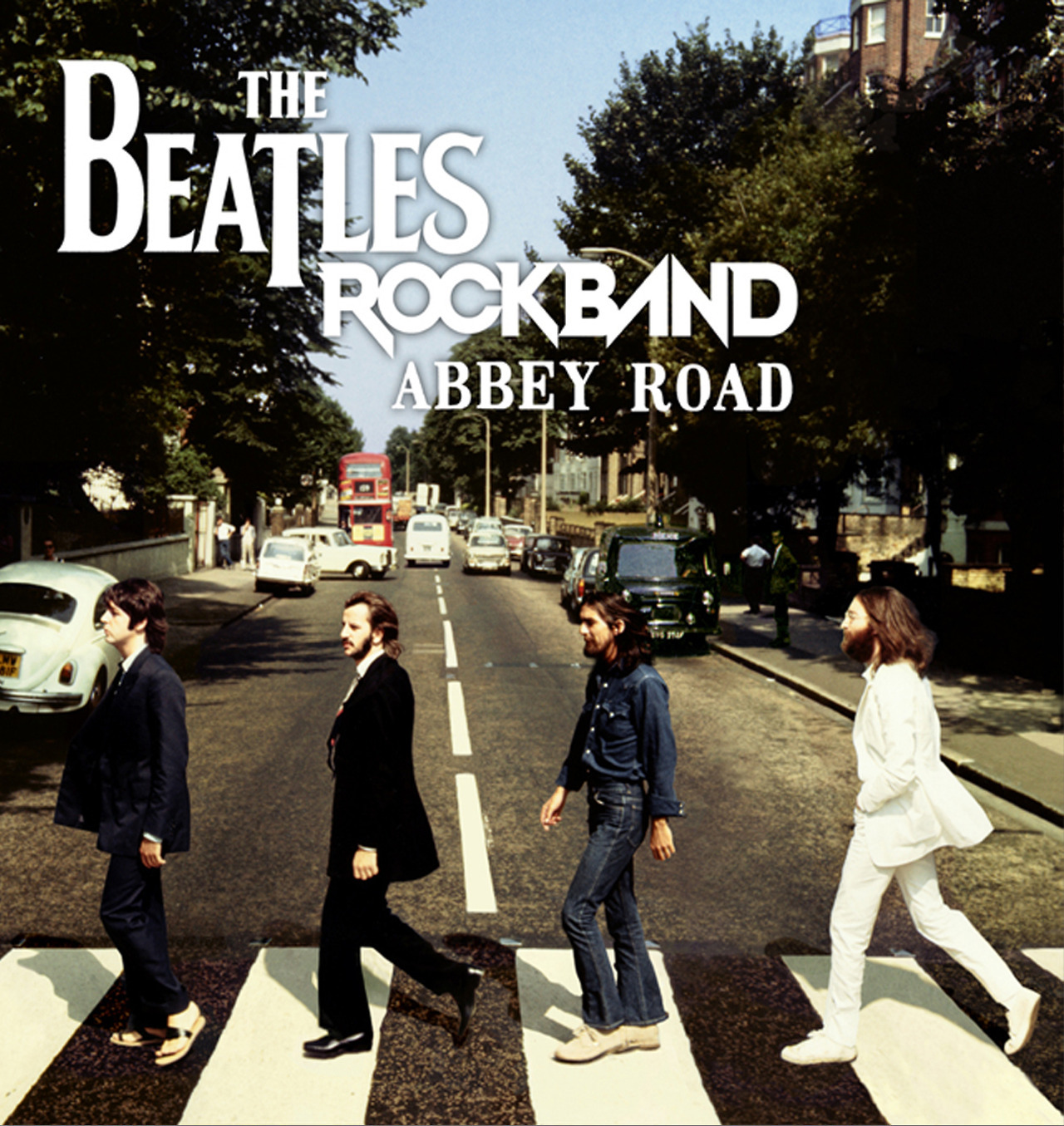
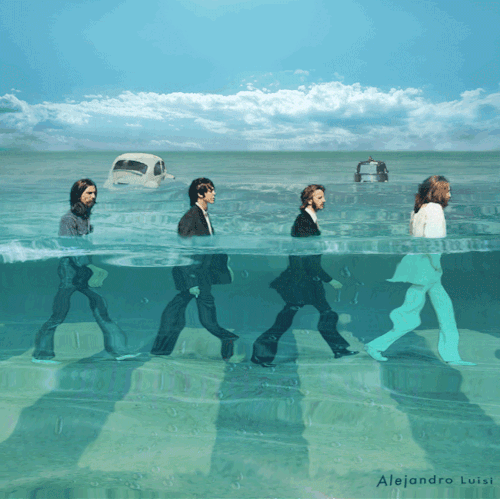
Abbey Road is the eleventh studio album by English rock band the Beatles, released on 26 September 1969 by Apple Records. The recording sessions for the album were the last in which all four Beatles participated. Although Let It Be was the final album that the Beatles completed before the band's dissolution in April 1970, most of the album had been recorded before the Abbey Road sessions began. A double A-side single from the album, "Something"/"Come Together", released in October, topped the Billboard chart in the US.
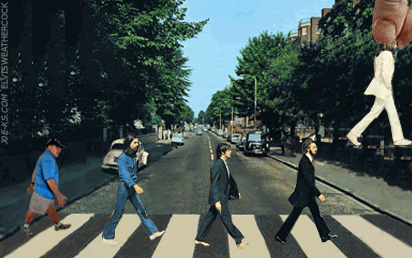
Abbey Road is a rock album that incorporates genres such as blues, pop, and progressive rock, and it makes prominent use of the Moog synthesizer and the Leslie speaker. Side two contains a medley of song fragments edited together to form a single piece. The album was recorded amid a more enjoyable atmosphere than the Get Back/Let It Be sessions earlier in the year, but there were still frequent disagreements within the band, particularly over Paul McCartney's song "Maxwell's Silver Hammer". John Lennon
had privately left the group by the time the album was released and
McCartney publicly quit the following year. A 16-minute medley of
several short songs comprise the majority of side two, closing with the
lyric "and in the end, the love you take is equal to the love you make".
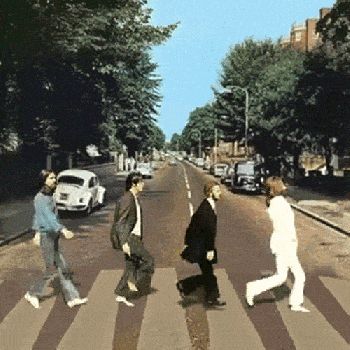
Although Abbey Road was an immediate commercial success and
reached number one in the UK and US, it initially received mixed
reviews, some critics describing its music as inauthentic and bemoaning
the production's artificial effects. Many critics now view the album as
the Beatles' best and rank it as one of the greatest albums of all time.
In particular, George Harrison's contributions, "Something" and "Here Comes the Sun",
are considered to be among the best songs he wrote for the group. The
album's cover features the four band members walking across a zebra crossing outside Abbey Road Studios and has become one of the most famous and imitated images in the history of popular music.
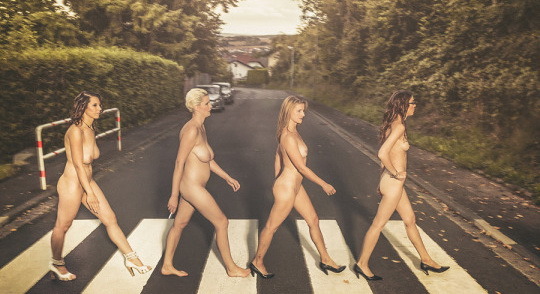
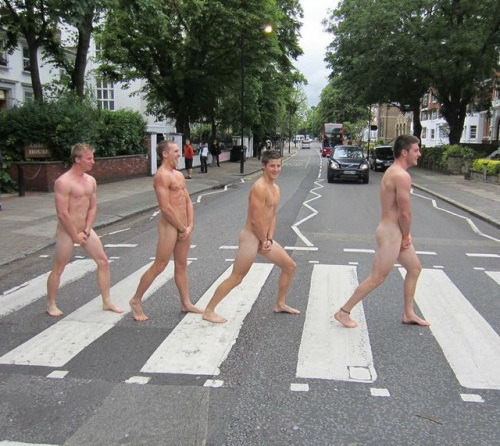
The Beatles ♪♫ Come Together
👇 🎼 👇
"Come Together" was an expansion of "Let's Get It Together", a song Lennon originally wrote for Timothy Leary's California gubernatorial campaign against Ronald Reagan.A rough version of the lyrics for "Come Together" was written at Lennon's and Ono's
Beatles author Jonathan Gould suggested that the song has only a
single "pariah-like protagonist" and Lennon was "painting another
sardonic self-portrait". MacDonald has suggested that the "juju eyeballs" has been claimed to refer to Dr John and "spinal cracker" to Ono. The song was later the subject of a lawsuit brought against Lennon by Morris Levy because the opening line in "Come Together" – "Here come old flat-top" – was admittedly lifted from a line in Chuck Berry's "You Can't Catch Me". A settlement was reached in 1973 whereby Lennon promised to record three songs from Levy's publishing catalogue for his next album.
"Come Together" was later released as a double A-side single with "Something". In the liner notes to the compilation album Love, Martin described the track as "a simple song but it stands out because of the sheer brilliance of the performers".
Here Comes The Sun
(Remastered 2009)
👇 🌞 👇
"Here Comes the Sun" was written by Harrison in Eric Clapton's garden in Surrey while Harrison took a break from stressful band business meetings.
The basic track was recorded on 7 July 1969. Harrison sang lead and
played acoustic guitar, McCartney provided backing vocals and played
bass and Starr played the drums.
Lennon was still recuperating from his car accident and did not perform
on the track. Martin provided an orchestral arrangement in
collaboration with Harrison, who overdubbed a Moog synthesizer part on
19 August, immediately before the final mix.
The song was not released as a single but still attracted critical praise. It has been featured several times on BBC Radio 4's Desert Island Discs, having been chosen by Sandie Shaw, Jerry Springer, Boris Johnson and Elaine Page. The Daily Telegraph's Martin Chilton said it was "almost impossible not to sing along to".
Since digital downloads have become eligible to chart, it reached
number 56 in 2010 after the Beatles' back catalogue was released on iTunes.
Harrison recorded a guitar solo for this track that did not appear in
the final mix. It was rediscovered in 2012, and footage of Martin and
Harrison's son Dhani listening to it in the studio was released on the DVD of Living in the Material World.
04. Because
05. Mean Mr. Mustard
06. Polythene Pam
07. She Came In Through The Bathroom Window
08. Golden Slumbers
09. Carry That Weight
10. The End
11. Her Majesty
12. Abbey Road Documentary
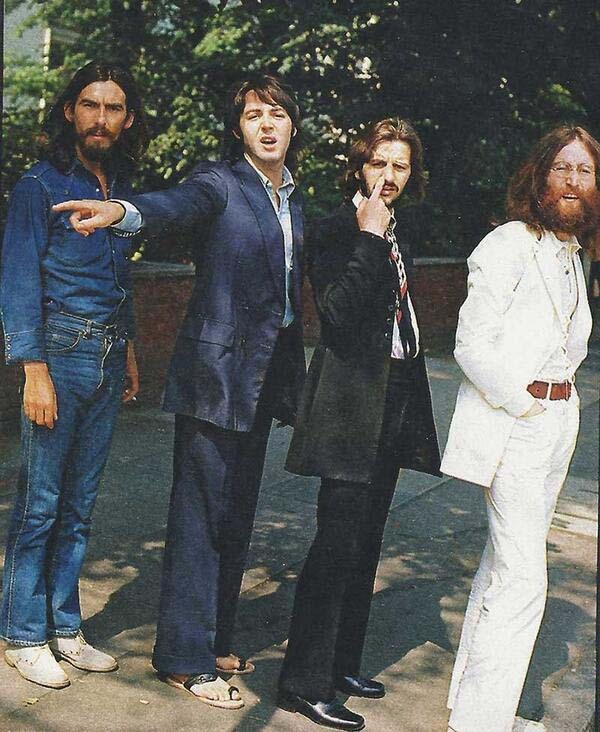
Contemporary reviews
Abbey Road initially received mixed reviews from music critics, who criticised the production's artificial sounds and viewed its music as inauthentic. William Mann of the London Times said that the album will "be called gimmicky by people who want a record to sound exactly like a live performance",
although he considered it to be "teem[ing] with musical invention" and
added: "Nice as Come Together and Harrison's Something are – they are
minor pleasures in the context of the whole disc … Side Two is
marvellous …" Ed Ward of Rolling Stone
called the album "complicated instead of complex" and felt that the
Moog synthesizer "disembodies and artificializes" the band's sound,
adding that they "create a sound that could not possibly exist outside
the studio".[100] While he found the medley on side two to be their "most impressive music" since Rubber Soul, Nik Cohn of The New York Times said that, "individually", the album's songs are "nothing special". Albert Goldman of Life magazine wrote that Abbey Road "is not one of the Beatles' great albums" and, despite some "lovely" phrases and "stirring" segues,
side two's suite "seems symbolic of the Beatles' latest phase, which
might be described as the round-the-clock production of disposable music
effects".
Conversely, Chris Welch wrote in Melody Maker:
"the truth is, their latest LP is just a natural born gas, entirely
free of pretension, deep meanings or symbolism … While production is
simple compared to past intricacies, it is still extremely sophisticated
and inventive." Derek Jewell of The Sunday Times
found the album "refreshingly terse and unpretentious", and although he
lamented the band's "cod-1920s jokes (Maxwell's Silver Hammer) and …
Ringo's obligatory nursery arias (Octopus's Garden)", he considered that
Abbey Road "touches higher peaks than did their last album". John Mendelsohn, writing for Rolling Stone, called it "breathtakingly recorded" and praised side two especially, equating it to "the whole of Sgt. Pepper"
and stating, "That the Beatles can unify seemingly countless musical
fragments and lyrical doodlings into a uniformly wonderful suite ...
seems potent testimony that no, they've far from lost it, and no, they
haven't stopped trying."
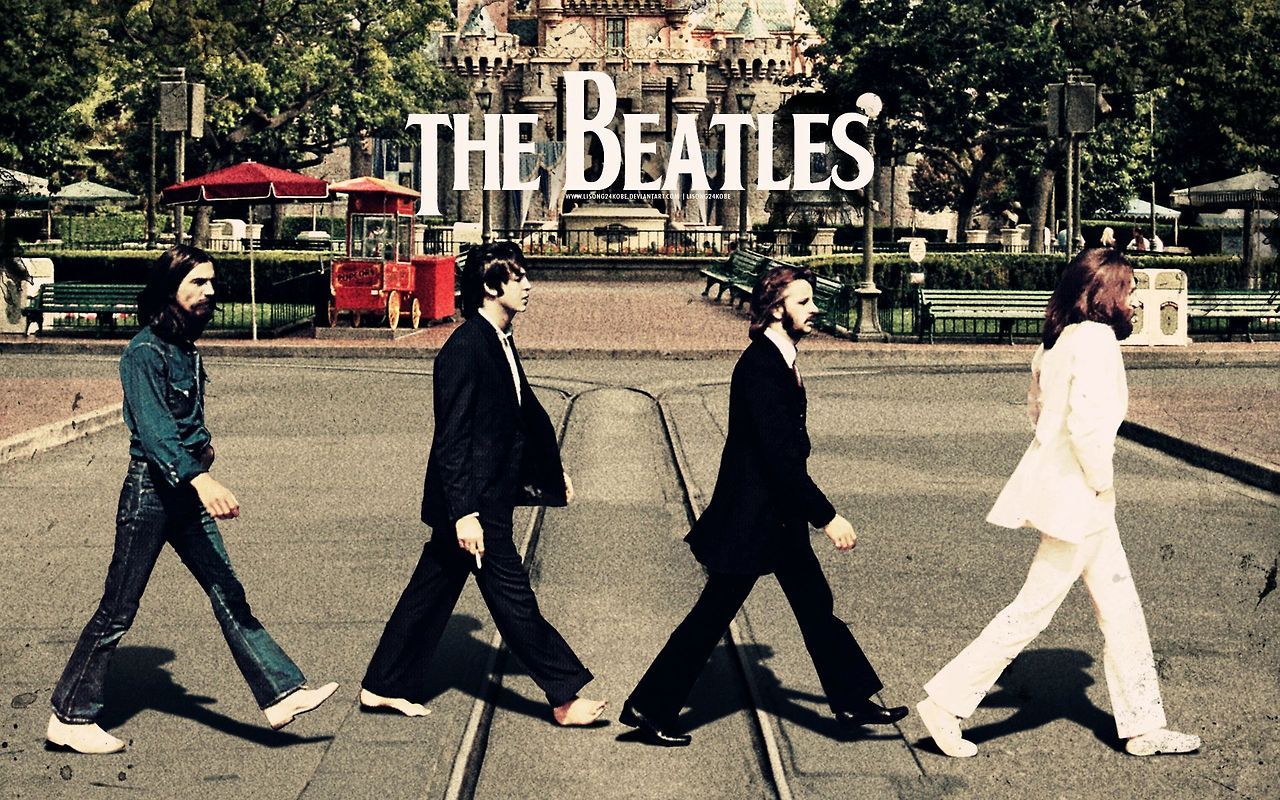
Retrospective reviews
Many critics have since cited Abbey Road as the Beatles' greatest album. In a retrospective review, Nicole Pensiero of PopMatters called it "an amazingly cohesive piece of music, innovative and timeless". Mark Kemp of Paste viewed the album as being "among The Beatles' finest works, even if it foreshadows the cigarette-lighter-waving arena rock that technically skilled but critically maligned artists from Journey to Meatloaf would belabor throughout the '70s and '80s". Neil McCormack of The Daily Telegraph
dubbed it the Beatles' "last love letter to the world" and praised its
"big, modern sound", calling it "lush, rich, smooth, epic, emotional and
utterly gorgeous". AllMusic's Richie Unterberger felt that the album shared Sgt. Pepper's "faux-conceptual forms", but had "stronger compositions", and wrote of its standing in the band's catalogue: "Whether Abbey Road is the Beatles' best work is debatable, but it's certainly the most immaculately produced (with the possible exception of Sgt. Pepper) and most tightly constructed."
Ian MacDonald gave a mixed opinion of the album, noting that several
tracks had been written at least a year previously, and would possibly
have been unsuitable without being integrated into the medley on side
two. He did, however, praise the production, particularly the sound of
Starr's bass drum.
Abbey Road received high rankings in several "best albums in history" polls by critics and publications. Time included it in their 2006 list of the All-Time 100 Albums. In 2009, readers of Rolling Stone named Abbey Road the greatest Beatles album. and in 2012, the magazine ranked it number 14 on its list of the 500 greatest albums of all time. The album was also included in the book 1001 Albums You Must Hear Before You Die.
Musicologist Walter Everett
interprets that most of the lyrics on side two's medley deal with
"selfishness and self-gratification – the financial complaints in 'You
Never Give Me Your Money,' the miserliness
of Mr. Mustard, the holding back of the pillow in 'Carry That Weight,'
the desire that some second person will visit the singer's dreams –
perhaps the 'one sweet dream' of 'You Never Give Me Your Money'? – in
'The End.'" Everett adds that the medley's "selfish moments" are played in the context of the tonal centre of A, while "generosity" is expressed in songs where C major is central. The medley concludes with a "great compromise in the 'negotiations'" in "The End", which serves as a structurally balanced coda.
In response to the repeated A-major choruses of "love you", McCartney sings in realisation that there is as much self-gratifying love ("the love you take") as there is of the generous love ("the love you make"), in A major and C major, respectively.
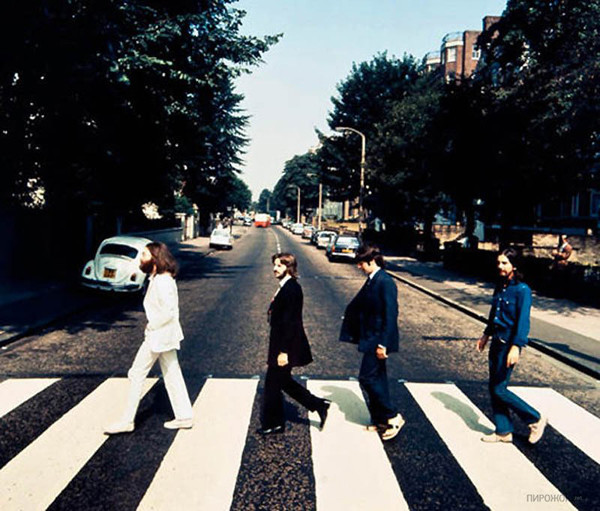

1 comment:
Nicely done! this photo is the iconic Beatles photo. It has inspired a lot people and were reenacted by some.
https://musicadvisor.com/a-major-scale/
Post a Comment